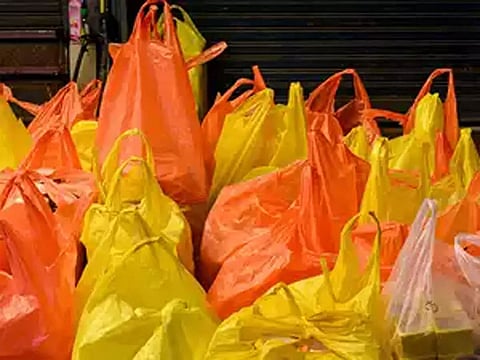
- Home
- Live Blog
- Breaking News
- Top Headlines
- Cities
- NE News
- Sentinel Media
- Sports
- Education
- Jobs

(Although
compostable, biodegradable, or even edible plastics are promoted as
alternatives from various materials such as bagasse (residue after extracting
juice from sugarcane), corn starch, and cereal flour, these are currently being
scaled and there are cost limits.)
Priyanka Saurabh
Single-use plastic (SUP) refers to those plastic items that are used once and discarded. The highest usage of plastics manufactured and used in single-use plastics ranges from the packaging of goods to bottles, polythene bags, food packaging, etc. It accounts for a third of all plastic produced globally, of which 98 per cent is made from fossils.
India is committed to taking action to reduce pollution caused by single-use plastic littering. In line with the clarion call given by Prime Minister Narendra Modi to eliminate single-use plastic by 2022, the Plastic Waste Management Amendment Rules 2021 have been notified, which prohibit the use of single-use plastics with low utility and high-litter potential by 2022. The government notification has banned the manufacture, sale, and use of identified single-use plastic items such as plates, cups, straws, trays, and polystyrene with effect from July 1, 2022. Directions have been also issued by the Centre concerning the ban on single-use plastics, under which the manufacture, import, stocking, distribution, sale, and use of single-use plastics including polystyrene and expanded polystyrene, items are prohibited with effect from July 1, 2022.
From December, polythene bags of less than 120 microns will also be banned. While manufacturers can use the same machine for 50-micron and 75-micron bags, machinery will need to be upgraded for 120-micron bags. On the demand side, instructions have been issued to e-commerce companies, major single-use plastic sellers/users, and plastic raw material manufacturers to phase out identified single-use plastic items.
Directives have been issued at the national, state, and local levels to curb the supply of identified items. For example, not all major petrochemical industries supply plastic raw materials to industries engaged in restricted SUP production. Plastic bags pollute land and water because they are lightweight. Plastic materials can travel long distances by air and water. When plastic remains in the environment for a long time and does not decompose, it turns into microplastic – first entering our food sources and then the human body.
The production of plastic materials is very energy-intensive. They require a lot of water for their production. Being non-recyclable, plastic bags end up in the oceans. When they arrive, they break into smaller pieces and are eaten by wildlife, which can cause health problems or even death. Many animals also get stuck in plastic bags.
Toxic chemicals released from plastic bags are harmful to human health and can damage blood and tissues. Repeated exposure can lead to cancer, birth defects, impaired immunity, hormone changes, endocrine disruption, and other serious diseases.
While the production model of plastics is huge and unregulated, the number of recycling plants is very small. In such a situation, a ban on single-use plastic will help. The government should educate the public and business bodies to reap the benefits of the ban.
At present, consumer awareness about the negative effects of single-use plastic waste is still limited. This needs to be further strengthened through communication, strategic planning, and consumer awareness campaigns. This will not only improve environmental awareness among citizens but will also empower and encourage wider action.
The government needs to promote alternatives like cotton, khadi bags, and bio-degradable plastics. There is also a need to provide economic incentives to encourage the adoption of environmentally friendly and purpose-appropriate alternatives that do not cause much harm. Support may include tax exemptions, research and development funding, technology incubation, public-private partnerships, and support to projects that re-use single-use items and turn waste into a resource that can then be re-used.
Another imperative is reducing or eliminating taxes on imports of materials used to make substitutes. Incentives could be provided to the industry by introducing tax exemptions or other conditions to support transition. Governments will face resistance from the plastics industry, including importers and distributors of plastic packaging. Give them time to adapt. Although compostable, biodegradable, or even edible plastics are promoted as alternatives from various materials such as bagasse (residue after extracting juice from sugarcane), corn starch, and grain flour, these are currently limited in scale and cost.
In the absence of robust testing and certification to verify the claims made by producers in India, counterfeit biodegradable and compostable plastics are entering the market. In January this year, the CPCB said that 12 companies were marketing carry bags and products marked as 'compostable' without any certification, and asked the respective state pollution control boards to take action against these units.
Revenue collected from taxes or levies on single-use plastics should be used to maximize the public interest. Further, environmental projects should be supported and local recycling promoted with funds. Jobs should be created in the plastic recycling sector with seed funding. The chosen measure need to be implemented effectively by ensuring a clear allocation of roles and responsibilities. The success of imposing plastic bag fees has also been established in cities such as Chicago and Washington, showing that such interventions can be effective in shaping behavior change. The European Union is considering new laws to ban some everyday single-use plastic products, including straws, cutlery, and plates, citing plastic litter in the ocean as the reason.
Countries such as the US, Canada and the Netherlands have already enacted regulations to prevent the use of microbeads in personal care products. The sooner India adopts such rules, the better. Picking up litter while jogging or walking was started on a small scale in a small part of Stockholm about a year ago, and it has spread all over the world. India can also adopt it.